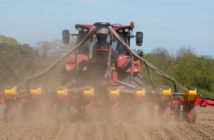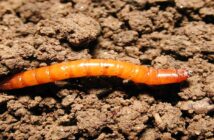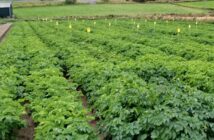A new ‘layered’ disease resistance approach for high output oilseed rape varieties will be launched by DSV at Cereals 2017.
The approach takes the company’s proven hybrid genetics to the next stage in its PNN (post neonicotinoid) breeding initiative, says the company’s UK managing director Mike Mann.
“PNN builds on the genetic foundation that has produced such established names as Lioness, Compass and Incentive, by developing varieties that require less agronomic intervention and are able to deliver optimum yield and oil content without neonicotinoids.”
The new approach adds different disease resistance and agronomic profiles to the core growth characteristics shared by all PNN varieties so varieties can be matched precisely with individual growing needs, he explains.
“All PNN varieties exhibit the primary characteristics of exceptional vigour for strong establishment, high efficiency photosynthesis to drive spring growth, unique plant architecture for the best pod development and consistent yield performance.
“Advanced disease resistance is the next step in making them as resilient as possible to allow them to produce the most cost-effective growth without high levels of inputs and so they can consistently deliver their full genetic potential.”
Up to four layers of disease resistance and key agronomic traits are envisaged in the future, Mike Mann says.
“A single-layered PNN variety has multi-gene resistance to light leaf spot and phoma stem canker – the most common diseases of oilseed rape.
“Subsequent layers might include resistance to turnip yellow virus and tolerance to verticillium wilt or non-disease traits like pod shatter.”
Although the specific characteristics may change between varieties, the more layers there are the greater the number of agronomic benefits and disease resistance features, he explains.
“The first of these new generation varieties to be introduced to the UK will be Sparrow 45 – named like the highly successful Incentive 45 for its rapid establishment in the critical first 45 days after drilling.
“Sparrow 45 is a single-layered PNN variety with excellent light leaf spot and phoma stem canker resistance.
“In fact, in the AHDB candidate list for 2017/18, Sparrow 45 has a 7 for light leaf spot and a 6 for stem canker.”
It also has one of the highest gross outputs on the list with 107% of control and a seed yield of 107% of control, too. Oil content is an impressive 45.5%, he adds.
“Although ideally drilled in the optimum autumn window, Sparrow 45’s considerable vigour means it can be later drilled if weather conditions dictate this.
“This in-built vigour is also seen in the spring when it is visibly one of the first varieties to get going when ground conditions warm up.
“In addition, Sparrow 45 has a prostrate growth habit which quickly produces considerable weed-inhibiting ground cover. This feature also means Sparrow is unlikely to need an autumn PGR.”
Up to four other PNN varieties with disease layering will now be entering the UK testing scheme with other varieties following closely behind, he says.




